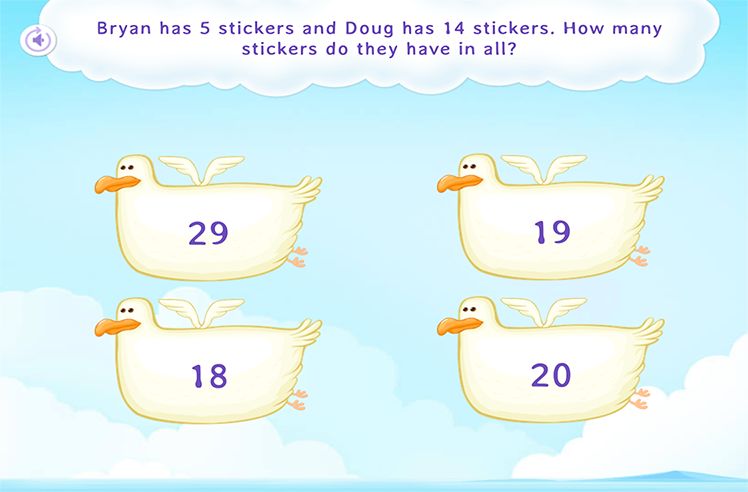What is Repeated Addition?
Repeated addition is a process of adding equal groups together. See here the below diagram has 5 groups of chickens and there are 3 chickens in each group.
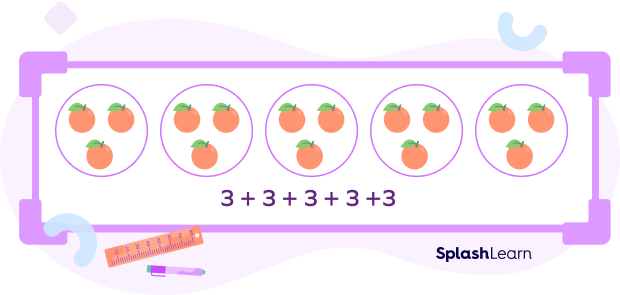
So, total number of oranges can be represented by repeated addition statement as
3 + 3 + 3 + 3 + 3 or 15
As shown below, repeated addition can be visualized by skip counting on a number line.
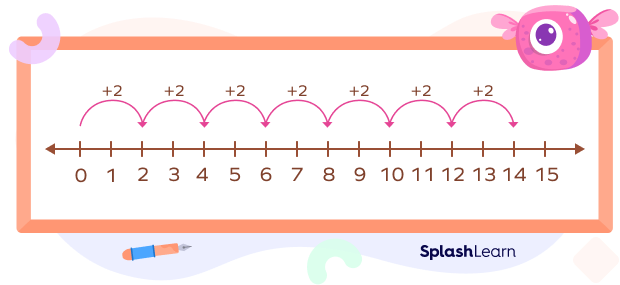
This can be written as repeated addition sentence as:
2 + 2 + 2 + 2 + 2 + 2 + 2 = 14
Recommended Games
Multiplication As Repeated Addition
Repeated addition is adding equal groups together, which is the same as the multiplication. If the exact number is repeated, then we can write repeated addition in the form of multiplication. For example,

As multiplication is repeated addition, each repeated addition can be written in two ways:
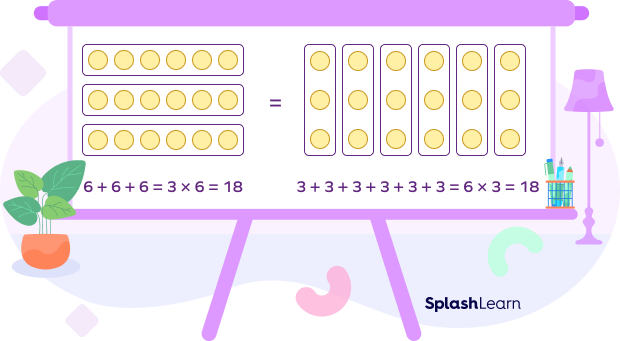
Repeated addition is also helpful in learning multiplication facts. For example if you are not familiar with 7 × 3 facts yet, you may find it easier to work out 7 × 3 by writing 3 + 3 + 3 + 3 + 3 + 3 + 3 or 7 + 7 + 7; and then slowly adding. It may also be helpful with larger numbers, such as 5 × 40. It is more comfortable writing 40 + 40 + 40 + 40 + 40 and then adding on the tens.
Let’s take a look at some more examples.
Andrew purchased 3 packages of muffins. Each package contained 4 muffins. How many muffins did Andrew purchase?
Three packages of 4 muffins each can also be written in numerical form as 3 ✕ 4 or 4 + 4 + 4, which is equal to 12.
So, in all, Andrew bought 12 muffins.
Recommended Worksheets
Repeated Addition Facts
- Repeated addition is to add equal groups or the same number over and over.
- Repeated addition is a precursor to teaching multiplication. It is an easier way for children to develop from addition to multiplication understanding.
Solved Examples on Repeated Addition
- What is the total number of counters in the given figure?
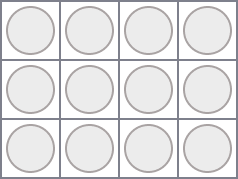
Solution:
There are 3 counters in each column and there are 4 columns.
3 + 3 + 3 + 3 = 4 ✕ 3 = 12.
So, there are 12 counters.
- Aaron has three boxes of markers and each box has five markers. How many markers does Aaron have?
Solution:
Five markers in each of the three boxes mean five added to itself three times.
This can be written as an addition sentence: 5 + 5 + 5 = 15
OR
This can also be written as a multiplication sentence as: 3 ✕ 5 = 15.
Thus, Aaron has 15 markers in all.
- Is the addition equation for this array 2 + 2 + 2 + 2 + 2 = 10 OR 5 + 5 = 10. Explain or show why you chose the equation that you did?
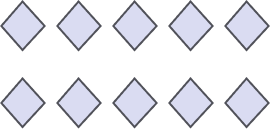
Solution:
One way of looking at this array is: there are 2 rows with 5 objects in each row.
In which case the addition equation would be 5 + 5 = 10.
The other way of looking at this array would be: there are 5 columns with 2 objects in each column.
In this case the addition equation would be: 2 + 2 + 2 + 2 + 2 = 10.
So, both the equations correctly describe the given array.
Practice Problems on Repeated Addition
Repeated Addition
Which of the following equations describes the following array correctly?
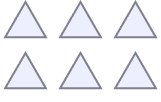
Explanation: There are 2 rows with 3 triangles in each row. Hence, 3 + 3 = 6.
Which of the following multiplication sentences correctly describes the given array?
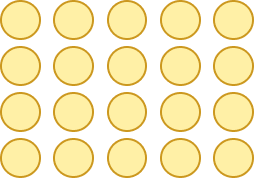
Explanation: This array has 4 rows with 5 objects in each row. Hence, we can write a multiplication expression for the given array as 4 ✕ 5.
If we remove one dot from each group, then which of the following expressions will represent the resulting model?

Explanation: If we remove one dot from each group, then we are left with 3 groups of 4 dots each, which is the same as 4 + 4 + 4 or 3 ✕ 4.
If we add one more equal group, then which expression will represent the resulting model?

Explanation: If we add one more equal group, then we get 4 groups of 4 dots each, which is the same as 4 + 4 + 4 + 4 or 4 ✕ 4.
Frequently Asked Questions on Repeated Addition
Is repeated addition the same as multiplication?
Yes. Repeated addition is also known as multiplication. This is because both the methods, although different, give the same answer. For example, if 3 is repeated four times we can either solve it as 3 + 3 + 3 + 3 = 12 OR we can solve it as 4 times 3 = 4 ✕ 3 = 12.
What is an array in math?
An array is an arrangement of objects or pictures in rows and columns. Arrays are used to represent and simplify math concepts. They provide a visual representation of the otherwise abstract math concepts.
What is repeated addition?
Repeated addition is adding equal groups together. It provides a foundation for understanding multiplication. For example, 3 times 5 can be understood as 3 groups of 5 counters and then written as 5 + 5 + 5 = 15. In this method, we don’t have to rely on multiplication tables to find the answer.
Why is repeated addition important?
Repeated addition is important as it provides a foundation for learning multiplication. It is a straightforward way to go from the additive to the multiplicative understanding.





















